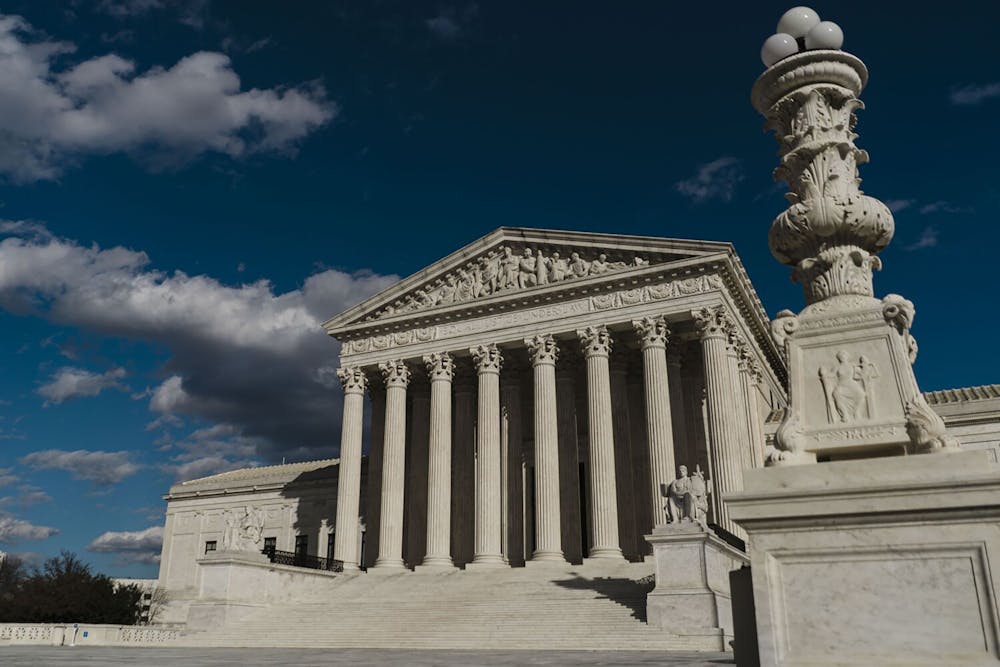The Supreme Court began its new term Oct. 2. During this term, the Court will rule on many key issues, including cases regarding gun restrictions, gerrymandering and public officials’ social media usage.
United States v. Rahimi
In the case of United States v. Rahimi, the Court will rule on whether a federal law prohibiting the possession of firearms by persons subject to domestic violence restraining orders violates the Second Amendment.
IU O'Neill School of Public and Environmental Affairs Professor Paul Helmke, who is also the former CEO of the Brady Center to Prevent Gun Violence, said this case comes after the New York State Rifle & Pistol Association Inc. v. Bruen decision in 2022, which established a new test that looks at whether gun restrictions have a historical analog.
Historical analog in this context means the courts must look at the historical record, referring to the Bill of Rights to see if there have ever been any regulations like the one in question.
CJ Heugel, J.D. Candidate at IU Mauer School of Law, said there is not going to be historical analog in this case, as domestic violence was not mentioned in the Bill of Rights.
In this case, the 5th Circuit Court of Appeals deemed the law unconstitutional, as it failed to show an established and representative analog, according to SCOTUSblog.
“The Supreme Court needs to clarify what they meant by historical analog,” Helmke said.
A clarification on this test is important for future legislation regarding gun restrictions.
Huegel said the decision will be particularly important because obtaining a restraining order is often the faster and less traumatizing way for domestic violence survivors to deal with their abusers.
Those who obtain a domestic violence restraining order often do so to protect themselves without having to pursue criminal charges.
“Pursuing a conviction is extremely difficult, and the people who have experienced this violence do not want to go up on the stand and relive it,” Heugel said.
This case will not only impact survivors of domestic abuse and those with domestic violence restraining orders, as this case has the potential to open up a large number of questions about current gun statutes due to the precedents it could set.
Alexander v. South Carolina State Conference of the NAACP
Alexander v. South Carolina State Conference of the National Association for the Advancement of Colored People, another case to be decided in the new term, deals with gerrymandering and elections.
In 2021, the South Carolina legislature adopted a new map for the state’s seven seats in the U.S. House of Representatives. In this new map, it moved nearly two-thirds of the Black voters in Charleston County out of District 1, which is currently represented by Republican Nancy Mace, into District 6, represented by Democrat Jim Clyburn. In 2018, District 1’s seat was won by Democrat Joe Cunningham.
Partisan gerrymandering is the practice of dividing a geographic area into electoral districts that gives one political party an unfair advantage, according to the Legal Information Institute.
According to the annotated version of the Constitution, the Court has determined successful claims of racial gerrymandering require plaintiffs to prove racial considerations were the dominant and controlling factor in creating the districts.
Gerrymandering based on racial makeup violates Section 2 of the Voting Rights Act, according to the LII.. Section 2 of the VRA prohibits drawing legislative districts in ways that improperly dilute minorities’ voting power.
In the case, the Court will decide if the South Carolina Congressional District One’s redrawing was unconstitutional. In Rucho v. Common Cause, a 5-4 decision, the U.S. Supreme Court ruled that federal courts have no authority to decide cases claiming political gerrymandering of legislative districts in states violate the Constitution, according to AP News.
In Jan. 2023, a three-judge federal district court ruled that District 1 violated the Constitution in its redrawing because it was the product of racial gerrymandering.
Helmke said he hopes this case will address what happens when gerrymandering is both partisan and racial.
“It could have a major impact on the future elections,” said Helmke.
Depending on the ruling, South Carolina might have to redraw their legislative districts for the 2024 election. The ruling also has the potential to affect how other states divide their legislative districts.
Lindke v. Freed
A third case to be decided this term is Lindke v. Freed, which deals with public official’s social media activity constituting state action.
In Lindke v. Freed, the U.S. Court of Appeals for the 6th Circuit ruled that Freed, the city manager, did not act on behalf of the government when he blocked a city resident who criticized him, according to SCOTUSblog.
Helmke said social media is a whole new area for the law, so it makes it tricky to figure out what the Court is going to do.
This case asks the Supreme Court to determine when and if a politician may block someone from engaging with their social media, according to LII.
This case is one of two cases this term that will decide on public officials’ social media usage, the other being O’Connor-Ratcliff v. Garnier.
The Court’s decision could define the scope of politicians’ responsibilities on social media, as the use of personal social media for political activity has risen in popularity, according to LLI.




